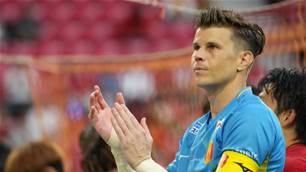Australian players are likely to face up an uphill battle making overseas moves in the near future according to one of Australia’s leading player agents.
Player movement has seemingly been on an ever-rising trajectory in recent years, with the 18,042 international transfers recorded by FIFA in the men’s game during 2019 representing a 9.1% increase on 2018.
Such a torrent of transactions can often mean that transfer windows can often come to resemble football’s silly season – both because of the moves that are made and those that are simply rumoured.
But with COVID-19’s economic impact on football and the world at large already so great and its future influence still widely unknown, just how silly coming transfer windows are going to be is a question that is impossible to answer.
It’s almost guaranteed that the amount of cash thrown around during transfer windows across the world – which peaked with Neymar’s €222m move from Barcelona to PSG in 2017 – will fall as football emerges, blinking in the sunlight of the post-COVID-19 marketplace. Selling markets throughout the world – such as those in South America – whose income streams are heavily dependent on the sale of talent to richer European and Asian clubs, are already attempting to come to grips with this new reality.
According to leading Australian player agent John Grimaud, player movement in the short- to medium-term, and possibly beyond, will likely be dominated by clubs seeking to bring in players without the need to place significant amounts of cash on the table - opting instead for transactions such as swap deals and loans.
This, in turn, may make it more difficult for Australian players, that have already faced an uphill battle, to find European clubs willing to take a punt on an ostensibly unproved player from the other side of the world.
“At the moment, the market’s very difficult,” Grimaud, who has played a role in overseas moves for talents such as Thomas Deng, Jacob Italiano and Mitch Langerak, told FTBL.
“Look at the leagues that have significant squad numbers – some clubs have 35 players in their squad – how are they going to pay players when revenue has been severely hampered by COVID-19?
“Squads are going to have to get reduced and players will have to get offloaded because clubs don’t want to pay their salaries. Players that a club thought was worth €10m are now only worth €3m or €4m.
“In the short term, the market is going to be flooded with players that European clubs already know and that will potentially be available for free or on loan to save their parent club the salary. It’s very difficult to compete.”
That age-old Australian problem of the tyranny of distance is also likely to be further compounded in the light of new measures designed to fight the spread of COVID-19.
Current Australian border restrictions dictate that any individual that is not a citizen or permanent resident of Australia, or their immediate family, must possess an exemption from the Australian Border Force Commissioner to enter Australia and any new arrivals must undertake a mandatory 14-day quarantine.
“The problem for us, on this side of the world, is that clubs can’t watch anymore,” Grimaud explained.
“It’s got to be done on video scouting. The clubs I’ve worked with in the past have never relied on video scouting for players.
“But what does the travel situation look like now and in the future? These are things that come into play.
“No club is going to come here and spend two weeks in a hotel before they can watch a player, and then they can’t watch them anyway because they’re playing in an empty stadium, so they can’t watch them live.
“All of these things are important factors in how business is done going forward. The world has changed. Whether we go back to what it was, I’m not sure.
“There are clubs that have got really small transfer budgets now; if they’ve got any. Some of them are looking for free players, loan players – who will be in abundance – so what’s the attraction to come to Australia and pick someone from the A-League?”
The sudden tightening of the market, according to Grimaud, is also going to force Australian players to take a harder look at their own careers when determining what kind of deals they’re willing to push for and accept in the new, post-COVID-19 reality.
“There’s always going to be demand for the best players; so as long as you’re considered one of the best players in your team you don’t have too much to worry about, but if you’re a squad member that’s coming out of contract you may have to reassess.
“That would depend on your age and where you’re at and your salary. If you are 29 years old and someone offers you five years at €1-2m a year, you’re going to take that. But if you are 19 years old and your first contract is max 10k euros a month, the shorter the better if you believe in yourself.”
Related Articles
.jpeg&h=172&w=306&c=1&s=1)
Socceroos prodigy returns to A-League after horror run

Star keeper's exit heralds hero's return at A-League giant













